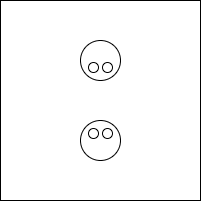An advanced alien species clones me on the atomic level, lines me up exactly across myself, in a perfect mirrored room:

I stare at myself for a second. Then, as a soft "hi" escapes my mouth, I notice that my clone does exactly the same. Every motion, everything, is mirrored.
In this experiment, we assume a perfectly deterministic psychological state: eg, given the same conditions, a person will always do exactly the same. (scientifically, that makes most sense to me)
Together with my clone, I'm trying to devise how to escape this unfortunate situation: eg, how to untangle us mirroring each other's motions.
The first idea we devise is to run into each other. We hope to apply Chaos Theory to the extent where both of us would fall in a slightly different way, and thus we would no longer be perfectly mirrored as such. But, if my understanding of physics is correct, our perfect opposing forces cause us to stumble and fall in perfectly mirrored ways.
For the second idea, I fetch a coin from my pocket. Just a coinflip won't work: we'd apply the same pressure to both our coins, and they'd land in the same spot. The idea is to number each corner of the room, and to decide the corner we're both going to through two coinflips. The corner we should go will be further away for one of us, thus breaking the mirror.
But, as we try to number the corners, we notice that we give the same number to opposite corners all the time. When I point at a corner, my mirrored self starts pointing at the opposite corner and giving it the same number.
I slump down to the ground. Will I be mirroring this perfect copy of myself for eternity? Or is there a way out?
As far as my understanding goes, in a deterministic framework, it is impossible to escape this scenario (eg, break the mirroring). In my opinion, determinism is separate from free will (eg free will is possible even when everything is deterministic). Am I correct or am I missing important things?
With quantum, you can go further: even if you're instantiated in a universe that starts out perfectly rotationally symmetric, as long as we're not modifying physics to guarantee the symmetry is preserved over time, then the vastly overwhelming majority of quantum behavior will not have spurious correlation between rotationally symmetric positions, meaning that the rotational symmetry will almost instantly be lost at the nanoscale, and then it's just some chaos away from having macroscopic effects. You can think about this under the many worlds interpretation: there's a vanishingly small fragment of the wavefunction where every time an atom collides with another atom in one position, the quantum random portion of the collision's outcome is exactly matched in the rotationally symmetric position. From the outside, this means that even picking which classical slice of the wavefunction is still symmetric requires you to specifically encode the concept of symmetry in your description of what slice to take. (I don't quite know the quantum math necessary to write this down.) From the inside, it means an overwhelmingly high probability of nanoscale asymmetry, and from there it's only chaos away from divergence.
I expect it would still take at least a few seconds for the chaos in your brains to diverge enough to have any detectable difference in motor behavior. If we were instead running the same trial twice rather than putting two instances in the same room across from each other, I'd expect it would take slightly longer to become a macroscopic difference, because the separate trials don't get to notice each others' difference in behavior to speed up the divergence.
Importantly, assuming many worlds, then the wavefunction will stay symmetric - for every classical slice of the wavefunction ("world") where person on side A has taken on mindstate A and side B has mindstate B, there's another world in which person on side A has mindstate B and vice versa. This is because if many worlds is correct then it's a "forall possible outcomes", and from the outside, it's not "randomized" until you pick a slice of this forall. It's unclear whether many worlds is physically true, so this might not be the case.